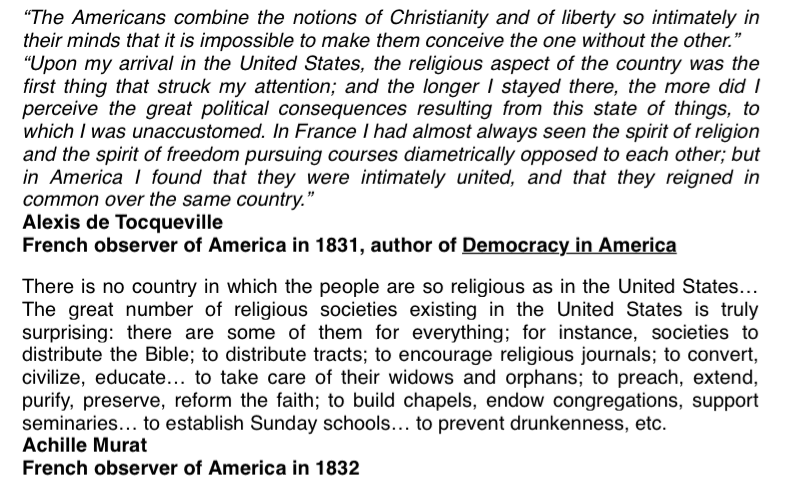Hobby Lobby makes a habit of running full-page patriotic ads every Fourth of July. This year is no exception. This year’s ad consists of a series of historic quotes tying religion and patriotism together. As I read through some of these quotations, I was struck in particular by two observations of the U.S. by foreign observers in the early 1830s:

Text of these quotes is as follows:
“The Americans combine the notion of Christianity and of liberty so intimately in their minds that it is impossible to make them conceive the one without the other.” “On my arrival in the United States the religious aspect of the country was the first thing that struck my attention; and the longer I stayed there, the more I perceived the great political consequences resulting from this new state of things. In France I had almost always seen the spirit of religion and the spirit of freedom marching in opposite directions. But in America I found they were intimately united and that they reigned in common over the same country.”
Alexis de Tocqueville
French observer of America in 1831, author of Democracy in AmericaThere is no country in which the people are so religious as in the United States … The great number of religious societies existing in United States is truly surprising: there some of them for everything; for instance, societies to distribute the Bible; to distribute tracts; to encourage religious journals; to convert, civilize, educate … to take care of their widows and orphans; to preach, extend, purify, preserve, reform the faith; to build chapels, endow congregations, support seminaries … to establish Sunday schools… to prevent drunkenness, etc.
Achille Murat
French observer of America in 1832
First is what I call the “so what” factor: Our country is not dictated to or circumscribed by the words of two Frenchmen written nearly two centuries ago. No one—literally no one—denies that religion played a very important role in our country during that period (or, indeed, that it continues to do so today). But the fact that our nation looked like one thing then does not mean it will always look like that one thing, or that it is or should be frozen in stasis.
Immediately after this observation, I was struck by another: When these passages were written, millions of Africans lived in slavery in our country. In fact, the claim that the spirit of religion and the spirit of freedom were “intimately united” in 1831, when millions were held in slavery and southern clergy defended this practice with the Bible, reads extremely strangely in retrospect. And it’s not just African slavery at issue here—the Trail of Tears began in 1831.
I’m not sure what is to be gained from claiming that our country was thoroughly and completely Christian at the same moment when millions of humans were kept as chattel property and hundreds of thousands of Native Americans were driven from their land after gold was discovered on it—and that’s leaving aside everything else that was about to befall the region’s native population, leading to its complete subjugation and even attempted genocide against it.
This isn’t exactly a great advertisement for Christianity. In fact, it rather risks being the reverse. If this was some sort of high point for Christianity, what does this say for Christianity?
A final point. As I put together this post, I noticed some context that is left out in relaying these posts. It’s not even context that is very hard to find. Because the ad was released in such a way as to prevent copying and pasting, I typed in a few words from each quotation and found the original. Space isn’t the only reason for truncating these quotations.
Alexis de Tocqueville’s second quotation, as you may recall from above, was included in the advertisement as follows:
On my arrival in the United States the religious aspect of the country was the first thing that struck my attention; and the longer I stayed there, the more I perceived the great political consequences resulting from this new state of things. In France I had almost always seen the spirit of religion and the spirit of freedom marching in opposite directions. But in America I found they were intimately united and that they reigned in common over the same country.
This paragraph, however, was part of a much longer piece, which continues as follows:
My desire to discover the causes of this phenomenon increased from day to day. In order to satisfy it I questioned the members of all the different sects; I sought especially the society of the clergy, who are the depositaries of the different creeds and are especially interested in their duration. As a member of the Roman Catholic Church, I was more particularly brought into contact with several of its priests, with whom I became intimately acquainted. To each of these men I expressed my astonishment and explained my doubts. I found that they differed upon matters of detail alone, and that they all attributed the peaceful dominion of religion in their country mainly to the separation of church and state. I do not hesitate to affirm that during my stay in America I did not meet a single individual, of the clergy or the laity, who was not of the same opinion on this point.
This does not exactly seem like something the Greens, Hobby Lobby’s owners, would agree with. In fact, the separation of church and state is under attack by many conservatives as being made up, and not something the founders intended.
But we’re not done, because de Tocqueville goes on to give some idea of what this separation of church and state actually meant and looked like:
This led me to examine more attentively than I had hitherto done the station which the American clergy occupy in political society. I learned with surprise that they filled no public appointments; I did not see one of them in the administration, and they are not even represented in the legislative assemblies. In several states the law excludes them from political life; public opinion excludes them in all. And when I came to inquire into the prevailing spirit of the clergy, I found that most of its members seemed to retire of their own accord from the exercise of power, and that they made it the pride of their profession to abstain from politics.
Yes, you’re reading that right.
In seeking to understand why the U.S. was so religious when religion wielded no power in government or politics, de Tocqueville concluded that it was this separation from the power of government that allowed religion to thrive. Religion, he argued, was the natural condition of man—he called it “simply another form of hope”—but when religion was united with government or temporal power, as it was in many other countries, this naturally caused men to hate it.
Religions intimately united with the governments of the earth have been known to exercise sovereign power founded on terror and faith; but when a religion contracts an alliance of this nature, I do not hesitate to affirm that it commits the same error as a man who should sacrifice his future to his present welfare; and in obtaining a power to which it has no claim, it risks that authority which is rightfully its own. When a religion founds its empire only upon the desire of immortality that lives in every human heart, it may aspire to universal dominion; but when it connects itself with a government, it must adopt maxims which are applicable only to certain nations. Thus, in forming an alliance with a political power, religion augments its authority over a few and forfeits the hope of reigning over all.
As long as a religion rests only upon those sentiments which are the consolation of all affliction, it may attract the affections of all mankind. But if it be mixed up with the bitter passions of the world, it may be constrained to defend allies whom its interests, and not the principle of love, have given to it; or to repel as antagonists men who are still attached to it, however opposed they may be to the powers with which it is allied. The church cannot share the temporal power of the state without being the object of a portion of that animosity which the latter excites.
Frankly, I’m finding this essay by de Tocqueville both timely and insightful—but not at all for the reasons the Greens included it in their advertisement. This, quite frankly, is what happens when you quote mine.
If you’re interested in reading the other quotes from the advertisement and then seeing their context as well, you are more than welcome to look at this interactive graphic created by the Freedom from Religion Foundation. It was from that graphic that I learned that the quote by Achille Murat, too, was taken out of context—perhaps even more so.
Here is the full Murat quotation. The parts included in the Hobby Lobby ad are in bold.
“From the pure doctrines of Unitarianism to the gross absurdities of Methodism, all shades may be found here, and every opinion has its partisans, who live in perfect harmony together. Among this variety of religions, everybody may indulge his inclination, change it whenever he pleases, or remain neuter, and follow none. Yet with all this liberty, there is no country in which the people are so religious as in the United States; to the eyes of a foreigner they even appear to be too much so; but that is only apparent as I shall explain to you.
[The ellipsis Hobby Lobby inserted here represents more than 4,250 words—19 pages of text.]
The great number of religious societies existing in the United States is truly surprising: there are some of them for everything; for instance, societies to distribute the Bible; to distribute tracts; to encourage religious journals; to convert, civilize, educate the savages; to marry the preachers, to take care of their widows and orphans; to preach, extend, purify, preserve, reform the faith; to build chapels, endow congregations, support seminaries, catechise and convert sailors, negroes, and loose women; to establish Sunday schools where young ladies teach reading and the catechism to little rogues, male and female; to prevent drunkenness, etc. This last society in particular is very singular, and very much extended. The members engage never to drink any distilled liquor, nor to permit its use in their families; but nothing hinders them from drinking wine. In that they mistake the Creator for a bad chemist.”
That rather paints a different picture, doesn’t it? This was no congratulatory epistle. It was in fact a critique of American religiosity—reprinted only in a very highly edited fashion.
I have a Patreon! Please support my writing!















